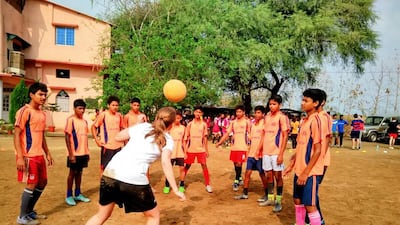One July morning in 2001, sports instructor Vijay Barse was on his way to work in Nagpur, India, when a heavy downpour forced him to take shelter under a tree. As he waited for it to abate, he watched a group of slum children kicking about a plastic bucket in the rain.
Perhaps it was because Barse himself came from an underprivileged background, but he couldn’t get that image out of his mind. A few days later, he went back to the Amravati slum with a football and organised a match between two ragtag teams of barefoot children.
That first game of jhopadpatti (slum) football would result in a tournament with teams of up to 128 of the city’s slums competing against each other.
The next year, it was a regional event, and by the third, national. Soon afterwards, Barse founded the charity Slum Soccer India.
Last month, his son Abhijeet received the inaugural Fifa Diversity Award on behalf of Slum Soccer at Soccerex Global Convention in Manchester. The charity was chosen from more than 100 organisations, including the Kick It Out anti-racism campaign, and Abhijeet was so surprised, he didn’t even have an acceptance speech prepared. “For India, this is one of the biggest honours Fifa has bestowed upon us,” he told the audience. “This is a tribute to what football can do for marginalised kids and their lives.”
Over the past 14 years, Barse’s tournament has grown into an organisation with more than 40 centres across India – in Maharashtra, Tamil Nadu, West Bengal and in Andhra Pradesh. Trainers work with youngsters from some of India’s most vulnerable communities, with many of the coaches hailing from those communities themselves, having trained up through Slum Soccer.
In 2006, Abhijeet returned from his PhD studies in the United States to help run the organisation. Slum Soccer uses football to engage with children, supplement their education and impart social messages like sanitation, life skills and gender equality.
“We change the format of the games to impart these messages,” says Barse. “We found that football is a very powerful and very easy vehicle to convey messages to these kids.”
There are coach training programmes which also help to improve the quality of the grassroots sport. Since 2007, Slum Soccer has sent teams to the Homeless World Cup, an annual contest which attracts teams from more than 70 countries.
Last year, the boys’ team came 33rd and the girls’ team 7th. But more important than winning or losing, the competition gives youngsters confidence to believe that they can find a way out of difficult circumstances.
Today, Slum Soccer supports more than 10,000 boys and girls across India. Many have gone on to find jobs in the police, railways and banks, thanks to sports quotas in recruitment processes.And one youngster was picked to train with Pune FC.
Others have completed coach training and have returned to work with the charity.
Homkant Surandase is one of the success stories. He hails from Ner, a village in Maharashtra’s Dhule district, where he grew up in a farming family threatened by drought and starvation. Debt has led to suicides in his farming community.
Under pressure from his family to find a job, Surandase ran away to Nagpur and found a job at a tea stall. Barse found him in one of the slums, brought him to the academy and, the next year, the boy was a part of the first Slum Soccer team to go to the Homeless World Cup in Melbourne.
“This was a life-changing experience for me,” says Surandase. “I saw the international lifestyle, I learnt a lot of new things and decided I wanted to be a professional player. I also started working in a community near my academy to help other kids like me.”
He still captains the charity’s teams, has trained as a coach and picked up an education in English. Prasanna, also from Ner, is another coach who has worked his way up. Then there’s Reena Panchal, a college student and coach who fought not only poverty but also a reluctant family to achieve her footballing dreams.
For Surandase, Prasanna, Panchal and others like them, Slum Soccer is not only a way out of their circumstances but also a way to give back. While Barse figures out how to double the organisation’s reach and expand further in India, they are trying to be leaders in their communities.
Surandase proudly tells me: “They now see me as a role model, someone who can help them change their lives. I know the problems they face, and I am able to help them overcome these problems. When they come to me with issues, I remember that I was also one of them. So I always say ‘yes’.”
Bhanuj Kappal is a freelance journalist based in Mumbai who writes about music, protest culture and politics.

